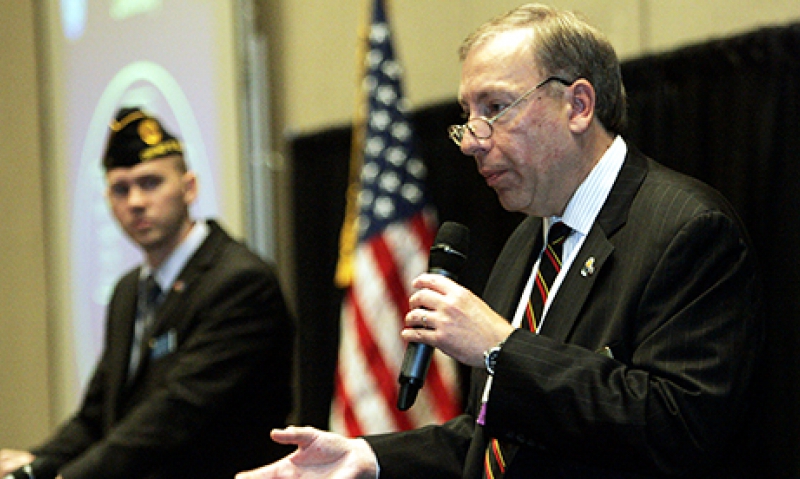
Jack Kull of the Defense POW/Missing Personnel Office briefs Legionnaires on current efforts to bring home the remains of America's fallen warriors from overseas.
In 2010, Congress authorized federal funding to increase the Department of Defense's (DoD) efforts of retrieving servicemembers remains from overseas. However,that expanded mission won't be guaranteed until the money is actually appropriated.
"By 2015, we need to have the resources, the teams in place, and the plans in place to identify at least 200 individuals a year," said Stephen Thompson of DoD's Joint POW/MIA Accounting Command (JPAC). "This is our mandate." Currently, JPAC identifies 75 to 85 remains of servicemembers annually.
Thompson and Jack Kull, a policy advisor for the Defense POW/Missing Personnel Office, briefed Legionnaires during The American Legion National Convention in Minneapolis on current efforts to bring home America's fallen warriors from overseas.
Thompson said JPAC's planned expansion included the hiring of 253 more employees: 208 civilian and 45 military. JPAC is also in the process of deciding where to place its single satellite lab, either in Omaha, Neb., or Fort A.P. Hill, Va.
Kull said that JPAC's current fiscal year budget is about $100 million. "For those of you who have worked with the budget, or worked with Congress, this was only an authorization act; it was not an appropriations act. Congress did not appropriate any money. But we're going to do the best we can."
Kull gave an overview of how DoD manages the retrieval of remains from overseas, the identification of servicemembers, and the notification of families. He explained that the Life Sciences Equipment Laboratory (LSEL) at Wright-Patterson Air Force Base in Ohio played a key role in crash site analysis.
"In Vietnam, there were many instances of high-speed crashes in planes carrying a lot of ordnance," Kull said. "Combining that with about 40 years of exposure to the weather, there are usually no remains. But LSEL can go to the site and tell if a pilot stayed in the plane or ejected. If he stayed, they can at least tell the pilot's loved ones that he died on impact."
From World War II until now, Kull said 83,000 servicemembers are still unaccounted for - most of them went missing in the Pacific, "and they will never be recovered because they are beneath the ocean." But a "reasonable estimate of those who can be recovered is 25,000 to 27,000."
While more than 13,000 remains from World War II were recovered from 1945 to 1951, about 73,000 warriors are still missing. Changes in environment, such as the construction of a shopping mall over the site where a B-17 bomber crashed, make some recoveries infeasible.An increase in JPAC funding would allow the DoD to create more investigation teams in fiscal 2012 and 2013 for the accounting of World War II personnel. "We could also double the number of our World War II recovery teams in fiscal 2013 and hire more historians to research our losses," Thompson said.
In North Korea, JPAC conducted 33 field operations from 1996 to 2005, visiting battlefields at Unsan, Chosin Reservoir and Kujang/Kunu-Ri. During that time, the remains of 89 U.S. servicemembers were recovered and identified. Unfortunately, operations were suspended due to increased regional tensions with North Korea, who had embarked on a program to develop nuclear weapons.
Because 7,987 servicemembers remain unaccounted for in North Korea, the U.S. government extended an invitation earlier this summer to Pyongyang, suggesting that field operations be resumed.
"North Korea responded positively to that invitation. So we are now in the process of working out the details: where we will meet, when we will meet, that type of thing," Kull said. "I wouldn't want to speculate ... but we've opened the door and they've said ‘Yes.' Now we'll take it to the next step. When we get the order to go back in, we're going to be ready."
If future negotiations with North Korea are successful, JPAC's immediate plans are return trips to Unsan and Chosin Reservoir.
Recovery efforts for the Vietnam War have been hampered because helicopter operations were suspended in 2009, following the crash of a commercial helo in Laos that injured several JPAC members. The command also lost seven members in a 2001 helicopter crash.
Recently, helicopter operations have been restored because JPAC obtained waivers that allow it to fly passengers and cargo on commercial aircraft. "But if something goes wrong, we may lose those waivers," Kull said.
If funding comes through for fiscal 2012, JPAC wants to add seven "Vietnam Recovery Teams" to its operations. Each team would include one anthropologist and three recovery specialists. Because Southeast Asia's acidic soil breaks down remains more quickly, Kull said Vietnam operations are "most challenging" and that "time is working against us."
According to JPAC, 1,685 servicemembers are still missing from the Vietnam War. Unresolved cases of reports that U.S. servicemembers were last seen alive have been reduced from 296 to 56 since 1973.
The decades-long Cold War still has 125 missing servicemembers, primarily from aircraft losses over oceans and seas. Greater access to Russian and Chinese archives may provide answers to the fate of these individuals.
The Persian Gulf War has two aviators unaccounted for - one flew in an F-18 Hornet fighter and the other was in an A-6 Intruder attack plane. When hostilities officially end in Iraq and Afghanistan, Kull said, JPAC will take on the responsibility of searching for men and women from those wars who never made it back home.
"The one thing I would ask you to carry back to your (Legion) Post, or to your respective POW/MIA committees, is that the United States government is dedicated and committed to the fullest possible accounting of our servicemen - and your comrades - who went missing in the service of this nation in foreign conflicts," Kull said.
- Convention

